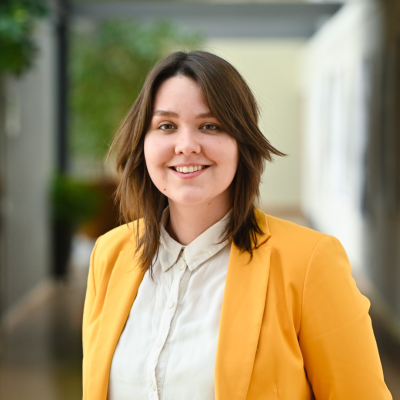
Simona Stražinskaitė
IIRPS VU International Relations and Diplomacy master's programme student
You are currently studying for a Master’s degree in International Relations and Diplomacy; how did you choose to study at the Institute? Which subjects do you like most?
I chose to study at IIRPS after completing my bachelor’s degree in Linguistics. International relations and political affairs have always interested me, so I decided to try my hand in a different field. I love my alma mater, so there was little doubt that if I wanted to study politics, I would study at Vilnius University. The IRD programme made me sweat, but perhaps the most memorable course was Dovilė Jakniūnaitė’s Theories of International Relations, where I had to learn the theoretical points that my fellow students had already graduated with a BA from the Institute knew. However, my favourite course I took during my studies was Conflict Analysis and Peace Studies by Lina Strupinskienė. Although this elective required a lot of reading time, it was fascinating, and the theories learnt allowed me to understand and analyse contemporary conflicts better.
You are currently working on your master’s thesis; what is your topic? How did you choose it?
The topic of my master’s thesis is “E. Macron’s vision of European autonomy: 2017-2022 developments and causes”. I chose this topic because I had previously studied English and French and had gone to France for six months to study, and after completing my bachelor’s degree, I also did an ERASMUS+ graduate traineeship at the Embassy of the Republic of Lithuania in Paris. So my interest in this country and my language skills were the main reasons why I chose this topic for my master’s thesis.
You work for the Ministry of Foreign Affairs; how did you choose this career path?
Actually, my internship at the Embassy led me to join the Ministry. Up until then, diplomacy seemed like something abstract, distant and out of reach for a 22-year-old student from a small town. But the people I met at the Embassy welcomed me warmly and took an interest in the work I was doing, and diplomacy turned out to be a colourful and diverse field, requiring different skills and knowledge, like a perfect storm, where various topics and different contexts intertwine. It was this dynamic and the opportunity to represent Lithuania abroad that made me choose the MFA.
What is the daily routine of working in diplomacy like? How do you fare as a young person in this field?
I have not yet encountered any routine in my daily life as a diplomat. I like to joke that sometimes I would be happy to be a minor character who does the assigned tasks and doesn’t bother about anything, but working in the Sanctions Group requires initiative, proactivity and continuous learning. Even if the day starts calmly, you never know how it will end. I love my job and the team I’m part of, so I’m doing well and always looking to improve myself to do even better! I always feel valued and have a sense of purpose in my work, so that’s my main motivation. In addition, the knowledge I have gained at IIRPS gives me the “tools” to understand and analyse the overall context of my work in order to perform the tasks assigned to me with high quality.
What would you like to wish the IIRPS VU community?
I would like to wish the IIRPS VU community to be multifaceted and not to be afraid to try themselves in different fields. To go to all possible internships, exchanges and training that are available because you never know where you can find yourself. Vilnius University offers a lot of opportunities, but it’s important to remember to take advantage of them. I would also wish you to learn languages because they really open doors, especially those belonging to the Ministry of Foreign Affairs!







